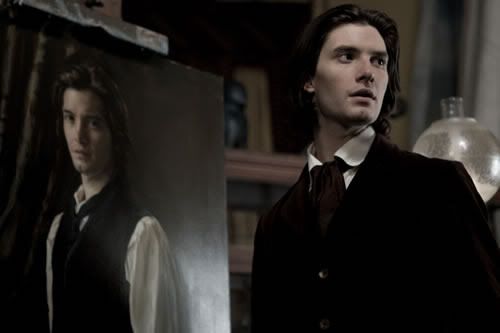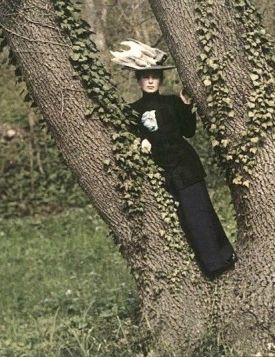Second, this post is me self-indulgently musing on my viewing experience, not a review. If it was a review, I would be morally obliged to give equal time to the many, many things this movie did wonderfully—for example, the casting of Ben Barnes as our eponymous antihero. If I mentioned this, I would also have to digress on whether the important aspect of Dorian’s looks is his youth or his beauty, and if I entered that argument, I would then have to back it up with lengthy textual evidence, which would itself require context…so this is not a review.
Let the debauchery begin.

My theory: the writers locked the script in an attic and went out with the book to have a good time. When they returned, they noticed a small change in the script…
So I’m in love with The Picture of Dorian Gray. I’ve read it at least eighteen times (all the way through—I’m not sure how many times I’ve flipped it open simply to browse). I own three or four copies and have memorized the introductory matter to each. True, I have nothing on Mr. Dorian Gray himself…
For years, Dorian Gray could not free himself from the memory of this book. Or perhaps it would be more accurate to say that he never sought to free himself from it. He procured from Paris no less than five large-paper copies of the first edition, and had them bound in different colors, so that they might suit his various moods and the changing fancies of a nature over which he seemed, at times, to have almost entirely lost control. The hero, the wonderful young Parisian, in whom the romantic temperament and the scientific temperament were so strangely blended, became to him a kind of prefiguring type of himself. And, indeed, the whole book seemed to him to contain the story of his own life, written before he had lived it. (The Picture of Dorian Gray, Chapter XI.)
…but this shows a limitation in available shelf space rather than ardor. I own an Oscar Wilde action figure and an Oscar Wilde plush toy. On the stranger end of things, I own a picture of myself dressed as Oscar Wilde and my significant other dressed as Dorian Gray. Friends assure me this is odd.
That said, I do not allow my obsession to blind me to the limitations of form. One simply cannot make a movie of Oscar Wilde’s book; it’s too big, too dense, too full of things that don’t translate well onto the screen (Chapter XI, I’m looking at you). Dorian Gray needed to cut something. My interest is in what it added.
Let’s start with the obvious. Dorian Gray is much more explicit than its ink-and-paper predecessor. And no, I’m not referring to the sexual content—that merits a discussion of its own, and one I’m not all that interested in, to tell the truth. I mean that several conclusions the reader was left to draw in The Picture of Dorian Gray were served beautifully on a platter in the movie.
Basil’s romance with Dorian, for example. To be fair, no one was in danger of getting jailed for homosexual content in the movie *mumblemumbleanti-sodomylawsmumblebullshitmumble*, but as in all romances, subtlety has its place. Now, in my reading of the book (which is a) certainly not the only one and b) based on both the 1890 and the 1891 texts), the fact that Basil is in love with Dorian is non-negotiable.
"You don't mean to say that Basil has got any passion or any romance in him?"
"I don't know whether he has any passion, but he certainly has romance," said Lord Henry, with an amused look in his eyes. "Has he never let you know that?" (The Picture of Dorian Gray, 1890, Chapter III.)
Strangely, Basil’s attraction is less obvious in the movie—probably because it is never discussed, certainly not at length as it is in the book—at the one scene towards the beginning that should make it obvious really doesn’t. Dorian is changing clothes after standing for his portrait; Basil gets a glimpse of him through the curtains; instead of betraying jaw-dropped lust (look, what you have to understand is that Ben Barnes is really really pretty) or aesthetic appreciation, Basil looks mildly confused. As in, “Why are you naked in my living room?”
Now, that can be a perfectly valid interpretation of Basil. But sometime before the movie’s halfway point, Dorian realizes that Basil is in love with him—beats me how, but I’m guessing he read the book—and uses it to manipulate Basil out of borrowing the picture. Mental whiplash, with obvious attractions, ensues.
This underplay/overplay thing happens again with Dorian’s tragic past. For those of you who missed it, it’s in Chapter III of the 1891 edition; his father was killed in a duel and his mother died of grief and his grandfather raised him and was generally an ass. The movie does away with much of this, killing off Dorian’s mother in childbirth and his father from fever, and making Dorian’s grandfather not only creepy but abusive as well. Yes, our beautiful Dorian has scars on his back (I screamed Felix! in the middle of the Sybil scene, actually.). Dorian’s tragic past goes from not present to glaringly explicit in fifteen minutes.
Not that I’m complaining about either of the above examples. As suggested by my linked reference above, M/M and abusive pasts are all right by me. But this next one rankles.
Let’s start at the end, with one of the [few] awesome lines in the movie. Awesome, because it’s what we wanted Book!Dorian to say to Book!Henry all through Chapter XIX.
I am what you made me! I lived the life that you preached but never dared practice. I am everything that you were too afraid to be.
The problem is, so far as the audience has seen, Movie!Henry indulges in exactly the same opium-induced, sex-filled madness as Dorian.
I think this could be played well. A closer comparison of Dorian and Henry could really highlight the effects of Dorian’s eternal youth, which would presumably mean different consequences for Henry and Dorian. But the movie doesn’t even seem to notice this. It changes Henry from a talker to a doer—changes, in terms of the novel, Henry’s form of Art—but leaves his character otherwise unaltered. So why don’t Henry’s sins torment him the way Dorian’s do? Or why do Dorian’s torment him so much? To a large extent, the movie has let the air out of the plot.
If everything before this point hasn’t been a heap of subjective blathering, it’s becoming one now.
In addition to a strange set of vices, Movie!Henry also has a daughter. This daughter is pretty much an elaborate stand-in for Hetty Merton, the country girl Dorian heroically abstains from eloping with in Chapter XIX. No sweat; plenty of Dorian Gray adaptations add or inflate (depending on your point of view) the role of this redeeming woman.
And I cry shenanigans on all of them. Because damn it, Dorian Gray is not supposed to be redeemed.
I’m sure that doesn’t sit well with movie audiences. We come to love Dorian in spite of (or perhaps because of) what he is—and perhaps we simply can’t bear to see something pretty get broken. If so, that bears out Wilde’s point marvelously. But The Picture of Dorian Gray doesn’t give the audience what it wants—in The Picture of Dorian Gray, Dorian Gray is not saved.
Vanity? Curiosity? Hypocrisy? Had there been nothing more in his renunciation than that? There had been something more. At least he thought so. But who could tell?... No. There had been nothing more. Through vanity he had spared her. In hypocrisy he had worn the mask of goodness. For curiosity's sake he had tried the denial of self. He recognized that now. (The Picture of Dorian Gray, Chapter XX.)
At the end of the novel, Dorian is ruined. There’s nothing good left in him—even his desire to be good is prompted by vanity, a desire that his soul not be ugly. And let’s be honest, Dorian never had a scrap of heroism in him—he’s called Prince Charming for his looks, not his actions. Dorian Gray lacks the capacity to be redeemed. If he didn’t, his picture would not be ugly.
The only reason to inflate Hetty Merton’s character is because you want her to be at least slightly effective (as Miss Wotton is in the movie). You want to show Dorian’s desire and ability to change. The problem is that none of this can be shown because none of it exists—it’s all dimensions of Dorian’s hypocrisy. Say it with me: Dorian is ruined, and redemption is impossible.
Wilde’s plot is tied up with his message and his message is tied up with the plot, like one massive daisy chain. You can’t just change part.
Uh-oh. Did I just say message?
I love the question “What is The Picture of Dorian Gray about?” because it says so much about its answerer. Some people say consequences, some say youth and beauty, some say it’s a novel about a murder (I don’t really like these people). My answer is that The Picture of Dorian Gray is about the influence of Art—specifically, about the way that Art is life.
Basil is his painting.
Sibyl is her acting.
Henry is his epigrams.
Dorian is…
Dorian is a connoisseur. Henry says that Dorian has made life his Art, which is literally true—think hard enough about the Picture as a collaboration between Dorian and Basil, and it will give you nightmares—but I think a major part of Dorian’s character is how he allows Art to become his life. Basil’s painting is his soul, Sibyl’s acting is his love, Henry’s epigrams and the yellow book are Dorian’s thoughts and actions. Dorian isn’t an artist himself—he’s an audience. When Basil speaks about the new mode of Art that Dorian suggests to him, this is what he means.
Does any of this come through in the movie? Don’t make me laugh. Sibyl’s acting has nothing to do with Dorian’s love. Whatever Dorian does to Basil’s painting, we can be sure Basil loves him for, ahem, different reasons. Henry is hardly a clever talker, and unlike anyone in the novel, he has a life—which is to say, Movie!Henry isn’t an artist at all.
So what is the movie about? What is the emphasis of Dorian Gray? Beauty? Youth? Consequences? Sin? Redemption? In all honesty, I draw a blank. This is a beautiful movie, but it reminds me
of those curious lines in some play—Hamlet, I think—how do they run?"'Like the painting of a sorrow,
A face without a heart."
Yes: that is what it was like. (The Picture of Dorian Gray, Chapter XIX.)
Saturday, February 20, 2010



Scathingly accurate without being bitter - how refreashing. Thank you, Megan
ReplyDeleteHey, it’s you! Our cheap papers writing service also favours the students operating on a tight budget. Don’t stress about the money because we got you covered in all aspects. Enjoy super discounts and flexible prices from our authors.
ReplyDeleteThanks for sharing this article. I think this will be so useful to new bloggers and I have to agree that internal linking is such a great and easy way to boost your website.
ReplyDeletebutcher shop springfield il
ReplyDeleteYour work reflects a lot of thought and planning. It’s well-organized and easy to digest. Great job!
quickest way to sell a house Ponte Vedra FL
I usually don’t comment on blogs, but your article is so convincing that I couldn’t resist. You’re doing a great job, man—keep it up!
ReplyDeletecorporate tax preparation
Thanks for delivering such an exciting post! I look forward to seeing more great content from you in the future. Keep up the good work!
ReplyDeletestrawberry shortcake ice cream bars
Thanks for delivering such an exciting post! I look forward to seeing more great content from you in the future. Keep up the good work!
ReplyDeletepumpkin spice coffee pods
Very unique and reliable blog. Thanks for sharing your valuable thoughts with us.
ReplyDeletegrocery store coupons
Thanks for sharing such a convincing and much-needed blog post. Nice work!
ReplyDeleteengagement rings
Thanks for sharing such a convincing and much-needed blog post. Nice work!
ReplyDeletefine wine store
Very nice blog! Keep posting more!!!
ReplyDeleteThanks for the great information! I found a similar blog that you can also visit for more insights.
ReplyDeletehouse powerwashing near me
I love the way you present your blog—informative and easy to follow. Thanks for your guidance!
ReplyDeletecommercial van flooring
Such a masterpiece, keep posting more such content!
ReplyDeleteReally appreciated this article. It offers helpful insights in a straightforward way and keeps the reader engaged. Definitely a valuable and enjoyable read.
ReplyDeleteSmall Business Tax Planning Services in Fort Worth TX
Business Tax Planning and Preparation Fort Worth TX
This was such an informative read. I appreciate how clearly everything was explained and broken down step by step. It made the topic much less intimidating and gave me the confidence to try it myself.
ReplyDeletecinnamon roll waffle recipes
Great insights here. It’s clear you put thought into making this accessible for readers at different levels of familiarity.
ReplyDeletethe madness of crowds book
This article couldn’t have come at a better time. I’ve been researching this topic, and your insights added real value.
ReplyDeletebakery Springfield il